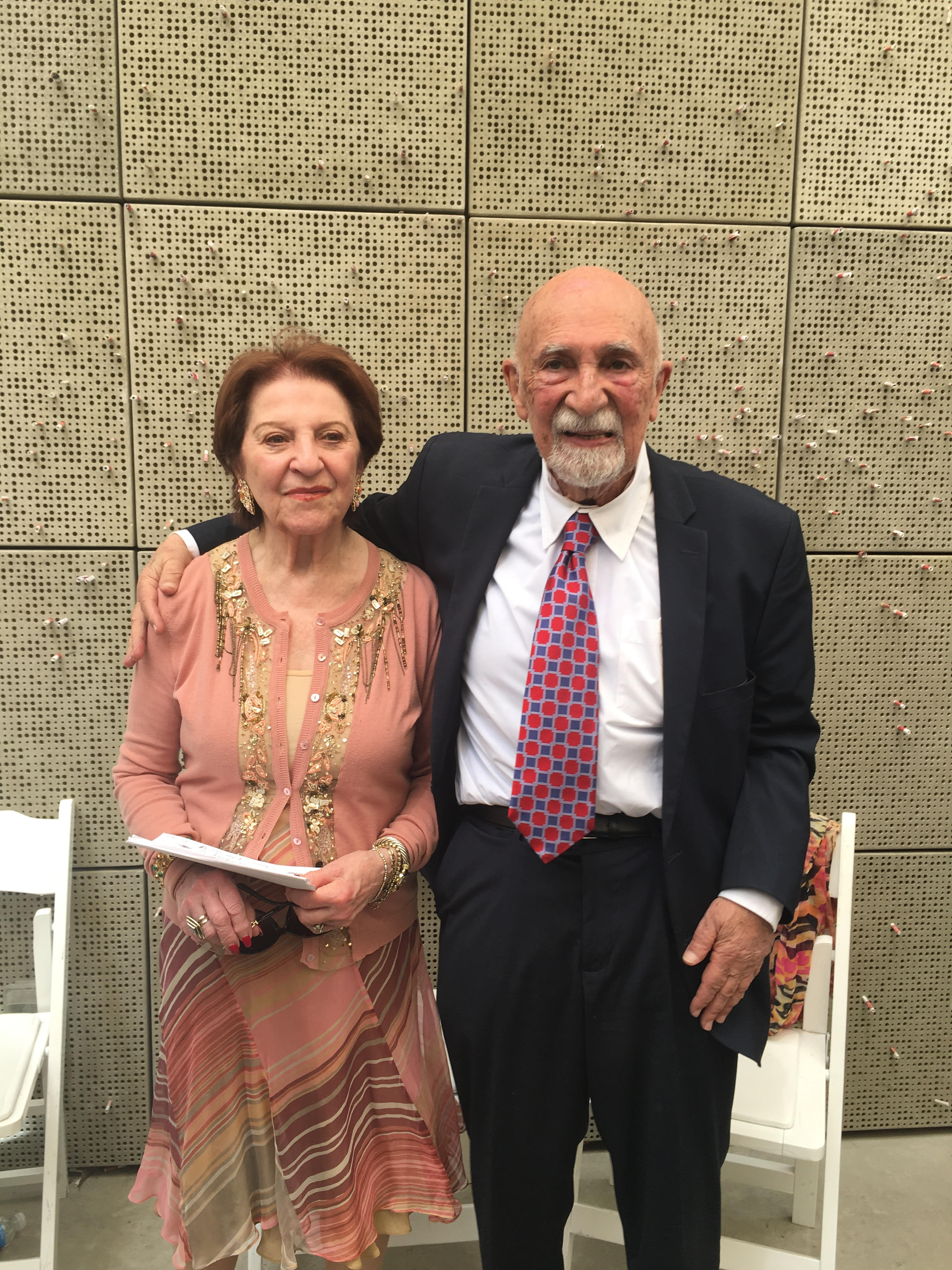 Childhood Holocaust survivors Alice Weit Gerstel and Simon Gronowski reunited last Sunday at the L.A. Museum of the Holocaust after not seeing each other for 76 years. Photo by Ryan Torok .
Childhood Holocaust survivors Alice Weit Gerstel and Simon Gronowski reunited last Sunday at the L.A. Museum of the Holocaust after not seeing each other for 76 years. Photo by Ryan Torok . In the summer of 1939, one month before Germany invaded Poland, two Belgian families vacationing in Ostende met and developed a friendship. The couples’ children, including 11-year-old Alice Weit Gerstel and 7-year-old Simon Gronowski, also quickly became friends.
Alice’s father, Herman, was in the diamond business in Antwerp, while Gronowski’s father, Leon, was in the leather business in Brussels.
When the Nazis invaded Belgium in 1940, Herman Gerstel foresaw more serious danger and planned for his family to get out of Belgium. In October 1941, he and Alice’s 16-year-old brother, Zoltan — who had developed a relationship with Simon’s older sister, Ita — went on a scouting trip to find a safe place for the family. Accompanied by a hired smuggler, and defying the 8 p.m. curfew, they set out in darkness.
Herman simultaneously sent his wife, Frida, and their three other children, including Alice, to stay with the Gronowski family in Brussels. The family left in the morning, wearing diamonds under their clothes.
The Gronowskis hid five people on the floor above the family’s leather business: Alice, her siblings Ita and Armand, Frida, and Frida’s mother, Blanche. Ten days later, the smuggler’s wife arrived to take the Gerstels out of Belgium.
“The train goes too fast.” They were the last words Simon heard his mother say before he jumped from the train bound for Auschwitz.
When the two families bade farewell, they had no idea it would be the last time they would see each other. The Gerstel family set off for France, eventually making their way to Cuba, while the Gronowskis’ route to liberation was laced with loss.
On April 19, 1943, Simon and his mother, Chana, were among the Belgian Jews awaiting deportation from Menchelen, a transit camp midway between Antwerp and Brussels. Three members of the Belgian Jewish Underground stopped the train with a red light that forced the driver to hit the brakes. As the train slowed to a halt, the resistance fighters opened up a car and many escaped. When the train started up again, passengers in Simon’s boxcar managed to pry open a door. Grabbing her son by the shoulders of his jacket, Chana lowered Simon onto a running board several feet below the moving car.
“The train goes too fast,” Chana said. They were the last words Simon heard his mother say. When the train slowed down, Simon jumped onto the tracks. Chana was gassed upon arrival in Auschwitz. A separate convoy transported Ita to Auschwitz. She also died there.
After jumping from the train, Simon ran into the woods. A Belgian police officer — later declared a Righteous Gentile — saved his life, putting him on a train back to Brussels, where he met a Catholic family that took him in until the Allies liberated Belgium in September 1944. A different Catholic family also hid Simon’s father, Leon. The two were reunited after the war. Leon, however, died at the age of 46 when Simon was just 13.
After the war, Alice heard that the entire Gronowski family, including Simon, had died. However, last year, her son, Dann Netter, a Los Angeles television producer, discovered Simon’s autobiography, “The Child of the 20th Convoy” which described the Gronowskis’ friendship with the Gerstels. Subsequently, Alice and her son tracked down Simon, who today is 86 years old, lives in Belgium and is an attorney.
On April 15, Simon and Alice, who lives in Westwood, reunited for the first time since their separation 76 years ago.
The two shared their story at Pan Pacific Park at the Los Angeles Museum of the Holocaust’s Yom HaShoah ceremony. Their rapport with each other was easy and familial. Both had vivid recollections from their time on the beach in Ostende.
Speaking in heavily accented English, Simon told the Journal what he thought about people coming together to mark the Holocaust. He said that every day for him is Yom HaShoah. Every day he remembers.
Alice weighed in. “He says Kaddish every day.”























 More news and opinions than at a Shabbat dinner, right in your inbox.
More news and opinions than at a Shabbat dinner, right in your inbox.